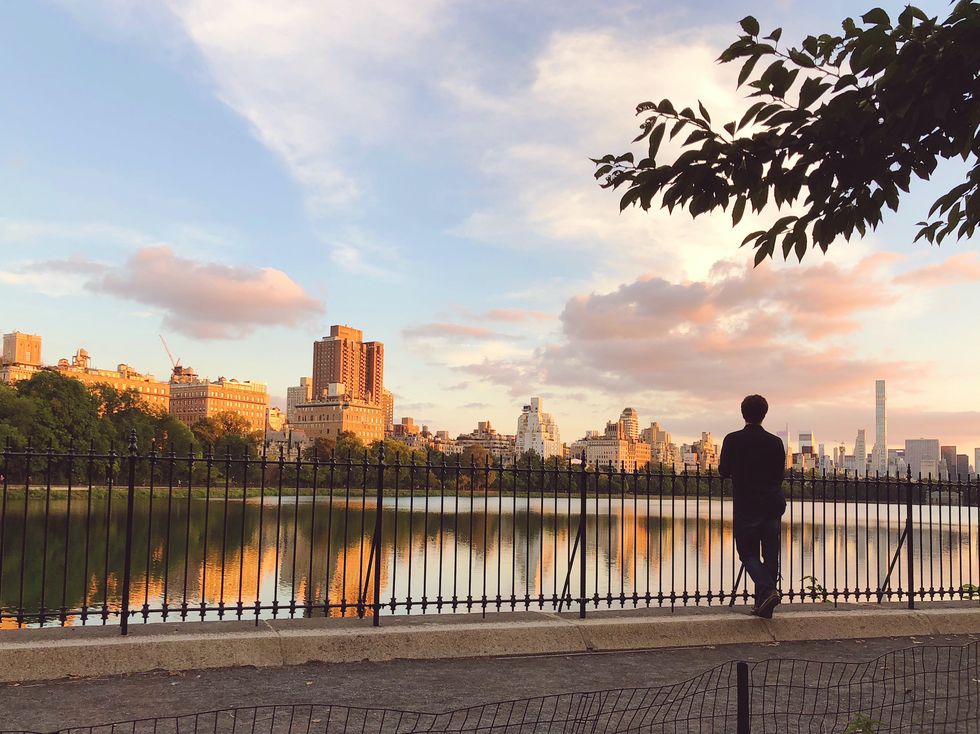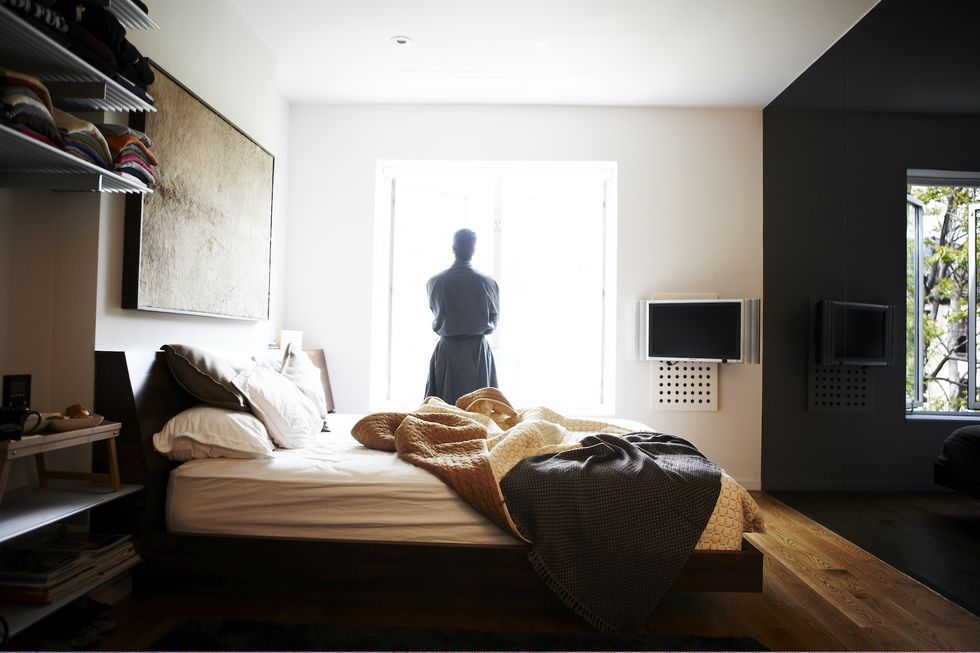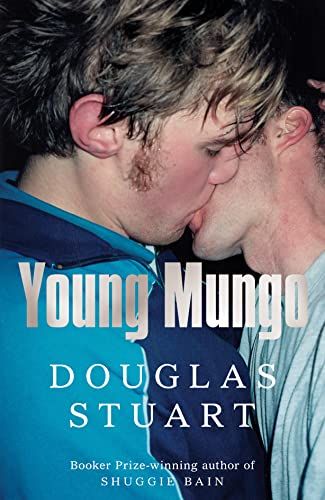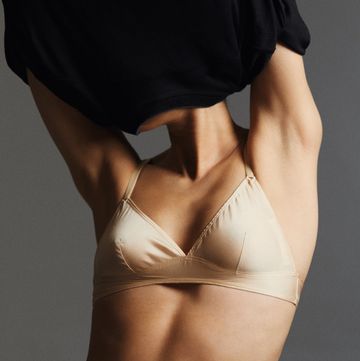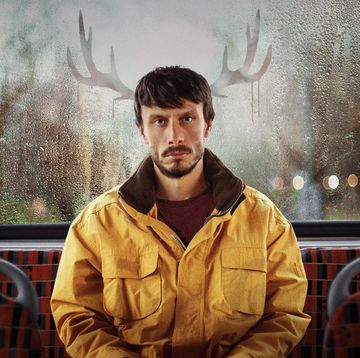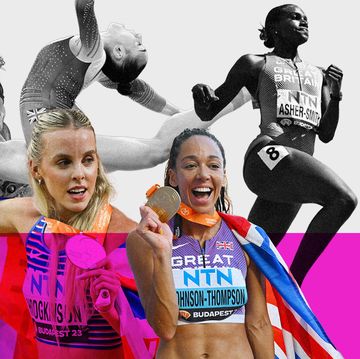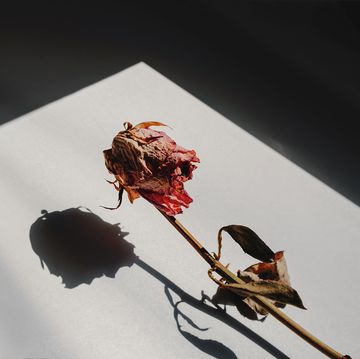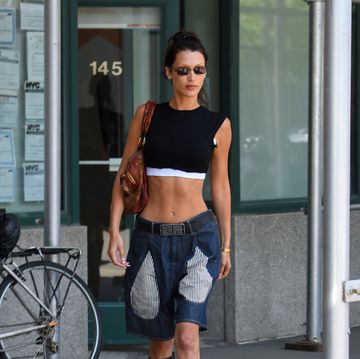I never went to New York thinking I was going to stay. I’d been studying for a masters in fashion design at the Royal College of Art in London and was about to graduate. It was a time when people from different fashion houses were coming in to meet students and recruit junior designers; Gucci and Prada had been in and chosen theirs already. My degree show had been based on the Shakers, a religious community living in New England. I’d always been fascinated by their very minimal, bare aesthetic and the idea of modesty in clothing. There was an honest approach to textiles that I loved, as well as a Rodarte-like power alongside a McQueen darkness.
My classmates’ work was so expressive and attention-grabbing compared to mine, which was incredibly quiet and made up entirely of black, slate-grey and a stark, snowy white. Those colour choices alone made it stand out, because there was this absence of colour. The head of design for Calvin Klein came and looked at all of the students’ work. Something about how reserved and minimalist my work was made him linger over my collection. Afterwards, he turned to me and asked if I wanted to come and work in New York. I didn’t even have to think about it; I said yes immediately. I was in student housing, so I was about to become homeless. Everything about my life had to change. And it did.
People often think that, because I’ve achieved quite a lot – both in fashion, where I worked as senior director of design for Banana Republic for 15 years, and in literature, as I won the Booker Prize with my debut novel, Shuggie Bain – I have this grand plan in life. But I’ve never been someone who believes too much in a plan. I think working with textiles has given me the patience of craft; I’ve known that, if I just put my head down and get on with it, things will unfold.
At 24, as a student, my entire thing was survival and security. I needed to find a job, to not have to worry about rent at the end of the week. And so, had it been any other company that had come through and offered me a job, had it been based in Wigan or Milan or the Hebrides, I would have said yes. There was no family home to go back to. I was an orphan, and I couldn’t go home to Glasgow.
Part of not having a plan also means you can be a bit overwhelmed by the things that happen. I hated New York so much at the beginning. I arrived during Labor Day weekend, at the end of August. It’s symbolic in a lot of ways for Americans, because it’s the end of their summer, all the fun goes out of them, and they’re ready to go back to work. I really hit the ground running in that way. I ended up in the Calvin studio as a junior designer. I would start at 8am and I would be lucky if we got out before 10pm. There were an awful lot of times I would be there until 3am. I wasn’t scared of hard work, but what didn’t suit me was that I didn’t feel like I owned myself. I’d never been forced to be somewhere until three in the morning, and you couldn’t leave because your boss was still there; suddenly, I didn’t have any autonomy over myself.
I also felt like a fish out of water working in the fashion industry. Every other week, I was threatening to go home. I would call my boyfriend – an American with whom I’d fallen madly in love – and tell him I wasn’t staying. I’d complain how these people didn’t get me and I didn’t know why we were making clothes that people couldn’t afford.
I’d been so unprepared to actually live in the city. By the time December came around, I couldn’t afford a winter coat. It’s not like London, where you can get away with a denim jacket and a big jumper. New York winters are bitingly cold. I had a friend who worked at Donna Karan, and she was so sick of seeing me shivering on the street that she stole a coat from work. It was this white puffer jacket that was meant to come to mid-calf on a woman and it came to mid-thigh on me. It had these bracelet sleeves, so it didn’t quite cover my arms, but it was so warm, like a big white duvet. That was my winter coat for the first couple of years in New York, before I could afford my own.
I grew up in some of the most socialist corners of Glasgow where there was always a sense that people knew you and understood you before they’d even fully met you. There’s such a sense of equality and fairness there. If you live in a council house, they’re all designed to be exactly the same. We all went to the same school; you knew when someone had new shoes, or a new jacket. It’s a lot of what my book Shuggie Bain explores: how your neighbours perceive you is how you are.
Even when I moved to London from Scotland as a student, there was a collective hive mentality. People hear your accent, or they get a little bit of your backstory, and they pigeonhole you instantly. They think they know your potential and your educational attainment and the things you’re supposed to like and dislike. I always felt constricted by that, especially when I went to America and I could look back to see how strange it was.
Conversely, the thing I loved instantly about New York was the anonymity, the ability to dissolve into the city. At first, no one understood where I was from. No one could find Scotland on a map and no one could understand what I was saying, with my Glaswegian accent. It was nice to be on the outside of their perceptions for a while. I loved that. I loved people being unable to define me.
But the thing that changed everything for me in the city was switching my job. Just over a year after starting at Calvin Klein, I quit and accepted a role at Banana Republic, which was part of The Gap. It was the early 2000s, and the company was booming around the world. Meanwhile, I was using my design talent to create clothing that anyone could buy. The socialist little boy and the creative inside me finally merged. I wasn’t going to make amazing clothes that we would only ever make three of and sell to incredibly wealthy people. Suddenly, I was doing something that meant the whole of me actually aligned.
I don’t believe anyone feels like they belong in New York, because I don’t think the city requires it. A sense of belonging is hard, as the place is forever refreshing itself. You belong in Glasgow, or whatever town you came from. That is your home, spiritually, and that is where your people are. But New York is always forever changing, so a sense of ‘I belong here’ is a hard thing to nail down: the city doesn’t care if you’re here or not.
But I don’t think I could’ve written Shuggie Bain, the story of a young boy growing up in a working-class family in Glasgow, had I remained on the West Coast of Scotland, because working-class men are not supposed to express themselves in that way. They’re not meant to talk about their hurt, or their vulnerability, or their trauma. We’re also not encouraged to think of ourselves as exceptional, and that can mean exceptionally great or exceptionally hard done by. You’re just one of many, and we’re kept together by a sense of solidarity.
New Yorkers are the antithesis of this. You meet someone, and their mother looked at them funny when they were seven years old and they had a terrible afternoon with their father and they will tell you all about it. There is no real trauma, but they will find the trauma in it. That emotional openness was fascinating to me: that ability to share stories, but also to feel the worth in your own story and in yourself.
I’m still, however, tempted to leave all the time. New York is a city that never goes easy on you. It’s expensive and busy, and if you’re really going to live in the city, you have to make sure you get everything you want out of its culture: the art, museums, restaurants. There comes a time when you think you’re maybe getting too old for it, and a little bit too poor. You’re always negotiating with the city. I certainly have been, ever since I turned up on Labor Day weekend with my two red suitcases and very little else.
Young Mungo is published in hardback by Picador on April 14.
This feature originally appeared in the May issue of ELLE UK


